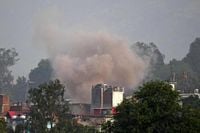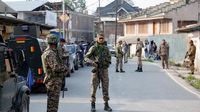On May 7, 2025, tensions between India and Pakistan escalated dramatically, resulting in a significant military confrontation that left at least 34 people dead and many others injured. This outbreak of violence marks one of the most intense military confrontations between the two nuclear powers since the Kargil War in 1999.
The conflict began late on the night of May 6 when India launched a series of airstrikes against what it described as terrorist infrastructure in Pakistan and Pakistani-administered Kashmir. According to the Indian Ministry of Defense, these strikes were carried out under 'Operation Sindoor' and targeted nine sites that allegedly housed terrorist camps. Lieutenant Colonel Vyomika Singh stated, "Nine terrorist camps were struck and destroyed," emphasizing that the strikes were aimed at minimizing civilian casualties.
In retaliation, the Pakistani army confirmed that it had engaged in artillery fire against Indian positions, with reports indicating that they had shot down five Indian aircraft, including three Rafale jets. General Ahmed Sharif Chaudhry, a spokesperson for the Pakistani army, stated, "The Pakistani army has shot down five fighter jets and a combat drone to defend itself against the enemy that was attacking it." The Pakistani military claimed that the airspace violations occurred in Indian territory.
The violence left at least 26 civilians dead on the Pakistani side, including three children aged between three and five years, and injured 46 others, according to the Pakistani army. Meanwhile, India reported eight fatalities and 29 injuries in the village of Poonch, located in the Indian-administered Kashmir, where heavy artillery fire was exchanged throughout the day.
The backdrop to this escalation was an earlier attack on April 22, 2025, when armed militants killed 26 tourists in Pahalgam, a popular destination in Indian Kashmir. India accused Pakistan of harboring the militants responsible for the attack, which reignited longstanding tensions between the two nations.
As the situation deteriorated, international reactions poured in, with calls for restraint from various countries and organizations. The United States, through its Secretary of State Marco Rubio, urged both nations to engage in dialogue to de-escalate the situation. He stated, "The world cannot afford a military confrontation between India and Pakistan." Similarly, the United Nations echoed these sentiments, emphasizing the need for a peaceful resolution.
France's foreign minister, Jean-Noël Barrot, also called for restraint, acknowledging India's right to protect itself against terrorism but urging both sides to avoid further escalation. He remarked, "We understand India's aspiration to protect itself against the scourge of terrorism, but we call on both India and Pakistan to exercise restraint to avoid escalation and to preserve civilian lives."
China expressed its readiness to play a "constructive role" in easing tensions, with the Chinese foreign ministry stating, "We are ready to cooperate with the international community and continue to play a constructive role in easing current tensions." The UK also stated it was "ready" to intervene for de-escalation, emphasizing its role as a friend and partner to both countries.
In the midst of the conflict, local residents reported severe impacts from the bombardments. A resident of Bahawalpur described the intensity of the explosions, saying, "I have never heard explosions this strong in my life; the windows of my house shattered from the blast."
The situation remains precarious, with both nations on high alert and military operations continuing along the Line of Control, the de facto border dividing the disputed region of Kashmir. Reports indicate that heavy artillery exchanges were ongoing, particularly around the Indian village of Poonch, which was heavily targeted by Pakistani shells.
Pakistan's Minister of Defense Khawaja Asif warned that their response would intensify, stating, "The response has begun, and if God wills, it will escalate further... it will not take long to resolve the issue." This statement underscores the potential for further military action, raising concerns about a broader conflict.
The international community is closely monitoring the situation, with many fearing that the escalation could lead to a full-blown war between the two countries, both of which possess nuclear weapons. The history of conflict between India and Pakistan, particularly over the Kashmir region, adds a layer of complexity to the current crisis.
As the dust settles on this latest round of violence, the hope remains that diplomatic efforts can prevail to prevent further bloodshed. However, with both sides entrenched in their positions, the path to peace appears fraught with challenges. The world watches anxiously as the situation unfolds, with the stakes higher than ever.






